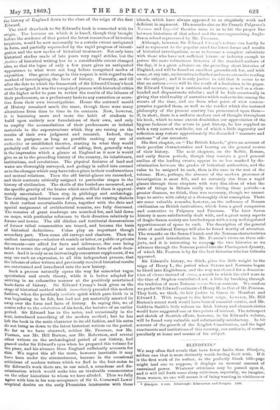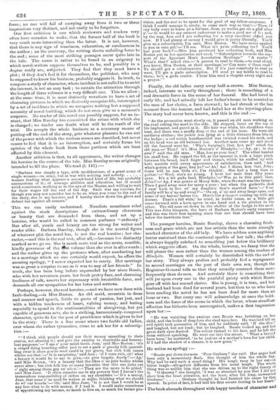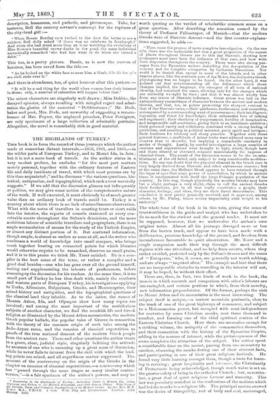BLINDPITS.*
WE may often find novels that have fewer faults than 131iudpits, seldom one that is more distinctly worth finding fault with. If it is the first work of its author, as the perfectly blank title-page might lead one to suppose, it displays an unusual amount of restrained power. Whatever criticises may be passed upon it, and it will call forth some sharp criticisms, especially, we imagine, from women, no one will accuse it of being wanting in vividness or
force ; no one will fail of carrying away from it two or three impressions very distinct, and not easily to be forgotten.
Our first criticism is one which reviewers and readers very often have occasion to make, that the former half of the book is very much more interesting than the latter. It is not, however,
that there is any sign of weariness, exhaustion, or carelessness in the author ; on the contrary, the writing shows unfailing force to
the end ; some of the most striking passages occur quite late in the tale. The cause is rather to be found in an exigency to which novel-writers suppose themselves to be, and possibly in a degree really are, subjected. They feel that they must have a plot ; if they don't feel it for themselves, the publisher, who may be supposed to know his business, probably suggests it. In truth, to compose a study of character, where incident is not called in to assist the interest, is not an easy task ; to sustain the attraction through the length of three volumes is a very difficult one. This we allow ; at the same time, it is most distinctly vexatious to have a set of charming pictures in which we distinctly recognize life, interrupted by a set of incidents in which we recognize nothing but a supposed necessity of novel-building, which do not even give us a moment's suspense. No reader of this novel can possibly suppose, for an instant, that Miss Barclay has committed the crime with which site is charged ; no reader can doubt what will be the result of the trial. He accepts the whole business as a necessary means of putting-off the end of the story, gets whatever pleasure he can out of the power with which the various scenes are described, but never ceases to feel that it is an interruption, and certainly forms his opinion of the whole book from those portions which are least affected by this element.
Another criticism is that, to all appearance, the writer changes his heroine in the course of the tale. Miss Barclay seems originally intended to fill the place. We read (i. 141.) :
"Barbara was simply a typo, with modifications, of a great army of single women—an army, but at war with nothing and nobody women leading what appears a second-hand kind of life, but probably unconscious of it ; of average abilities and education, but of sound vivid conscience, working as in the eye of the Master, and willing to wait for their wages till the end of the day. Such was my heroine, for though you may not consider her to be so, when you come to the end of the story, she is my heroine, and I hereby throw down the glove and defend her against all comers."
This we can easily understand. Novelists sometimes rebel against the stock descriptions of extraordinary cleverness or beauty that are demanded from them, and set up a heroine, who would be called in common parlance "ordinary." But after all, youth and beauty are too strong for writer and reader alike. Barbara Barclay, though she is the central figure of whatever plot the novel has, is not the real heroine ; her character,—and this is the real test, after all,—becomes less distinctly marked as we go on. She is much more real as the acute, sensible, kindly governess of the iltst volume than she ever is afterwards ; and the author gives up the pretence when, after conducting her to a marriage which no one certainly would expect, he offers the amusing apology, "I never expected her to marry. Her marriage was as great a surprise to me as it was to any of her friends." In truth, she has been long before superseded by her niece Bessie, who with her seventeen years, her fresh pretty face, and charming liveliness of talk, asserts her supremacy with irresistible force, and demands all our sympathies for her loves and sorrows.
Perhaps, however, the real heroine,—and we have now done with fault-finding,—is Miss Boston. An old maid, eccentric in dress and manner and speech, liable to gusts of passion, but just, and with a hidden tenderness of heart, valuing money, and hating especially to spend in the seutituentalities of almsgiving, but yet capable of generous acts, she is a striking, harmoniously-composed character, quite fit for the post of providence which is given to her in the story. There is a fine scene where two feeble old ladies, over whom she rather tyrannizes, come to ask her for a subscription :—
" 'I think rich people should use their money according to their station, not abusing it ; and give the surplus to charitable and benevolent purposes.'—' I am o' your mind there, Jean,' said Miss Boston ; 'it's a stupid thing hoarding sillor just to set a pack o' greedy folk quarrelling over it afore you're weel cauld in yer grave, but rich folk canna whiles son that.'—' It is surprising,' said Ann ; if I were rich, oh! what a luxury it would be to me to give,—to give largely, freely!'—'Ay,' said Miss Boston, it's a luxury that the likes o' us puir bodies whiles crave after ; but rich folk hao so many luxuries that this ano jinks out o' sight amang them gey an' aften.'—, They are the more to be pitied,' said Miss Jane. 'It often consoles me in my poverty that I haven't the tremendous responsibility of riches on my shoulders.'—` It's a mercy, Jean, that mine o' us need lie waken at night, thinking what we should do wi' our hoards.•---' Oh,' said Miss Jane, ' it is not that I would be at any loss what to do with money, if I had it. I would make conscience of apportioning my income, so much to live on, so much for future pro vision. and the rest to be spent for the good of my fellow-croaturos. I think I could manage it, nicely, in some such way as that.'—' Then, i f ony body were to leave ye a fortune, Jean, ye wadna get sic a gliff after eV= It would bo my earnest endeavour to make a good use of it ; and by the way, Ann and I are collecting for a very excellent object just now. If I had plenty of money I would give it pretty liberally. You'll give us a subscription, I'm sure, Miss Boston. We have never applied to you in vain yet.'—' I'll see. What is't ye're collecting for? You'll hao your book ?'—Miss Ann produced her collecting book, and Miss Boston put on her spectacles and read, ' "Subscription towards the support of the Ignorant Men's Association Meetings." "A reader "! What's that?' asked she.—' A person to read to thorn,—to read aloud, you know, Miss Boston, at their meetings.'—' Can nano o' them road? Ye should got a schulemaistor. But if it's just somebody to read ye want, I'll gie a gude subscription. I'll send yo my laddie to read to them; he's a gude reader. I hear him read a chapter every night and a prayer.'"
Finally, the old ladies carry away half-a-crown. Miss Boston, indeed, interests us vastly throughout ; there is something of a real dramatic force in the scene of her funeral. She had loved in early life, and had actually left her father's house to be married to the man of her choice, a farm steward ; he had shrunk at the last moment from the honour, and had failed her at the trysting-place. The story had never been known, and this is the end :—
,‘ As the procession went slowly on, it passed an old man working on the road raking the mud to the side. He stopped, leant on the top of his implement, and gazed at it. His hair was white, his shoulders were bent, and there was a snuffy drop at the end of his nose. He wore old corduroy clothes ; the jacket was lying at a little distance from him in the hedge ; a red cotton handkerchief was twisted round his neck, and on his head was an old battered hat. Another man came up and stood till the funeral went by. Wha's burying's that, ken ye?' asked the old man.—' That? it's Miss Boston's o' Blindpits.'—' Ay, ay ; is she awe'?' said the old man. Man, hae ye your box?' The other banded his snuff-box. He tapped the lid, as the manner is, took a huge pinch between his broad, hard finger and thumb, which he sniffed up with both nostrils with every appearance of satisfaction, then said, And wha's gotten a' the gear, ken ye?'—' Ah! but I dines ken that, John ; there will be nae little o't, I'm thiukin'. She had a lang time to gather.'—' Wool, she's no young. I kent her mair than fifty years sine. It's a bit gude land, Blindpits.'—' Was ye in this pairt then, John?'—' Ay, I was grieve at Mossy Sido, when Stewart was the farmer. Then I gaed away west for mony a year ; but when the gudewifo died I cam' back to live wi' my daughter that's married here.'—' Your family will be a' up and away?'—' Oa ay, a' up and away lunge syno, and some of my bairns' bairns toe. Hero's the youngest coming up with my dormer. That's a fell wifie,' he cried, in treble tones, as a little girl came forward with a horn spoon in one hand and a tin pitcher in the other. The old man sat down in the shelter of the hedge to his meal. This was John Simpson, the hero of Barbara Boston's early romance ; and this was their first meeting since that one that should have been below the hawthorn tree."
The younger heroine, Bessie Barclay, shows a charming freshness and grace which are not less artistic than the more strongly marked character of the old lady. We have seldom seen anything better sustained than the continual sparkle of her talk ; the effect is always happily subdued to something just below the brilliancy which suggests effort. On the whole, however, we fancy that she will please the men rather than the women among the readers of Blinclpits. Women will certainly be dissatisfied with the end of her story. They always profess and probably feel a repugnance to second marriages on the part of their own sex, though the Registrar-General tells us that they actually contract them more frequently than do men. And certainly there is something that will jar upon every one in the youthful gaiety with which Bessie goes off with her second choice. She is young, it is true, and her husband had been dead for several years, but then to us who have been reading the novel he has not been dead for more than an hour or two. But every one will acknowledge at once the boldness and the force of the scene in which the lover, whose steadfast affection has hitherto been unrecognized, makes a first impression upon her :—
" He was watching the anxious care Bessie was lavishing on her child, and the looks of deep love she shod upon her. He watched till an evil spirit took possession of him, and he suddenly said, If she dies!' and laughed, but not loud ; but he laughed. Bessie looked up, and her groat dark eyes flashed. The colour rushed to his face, and he left the room without speaking. He wont out into the street. ' What a brute I have been,' he muttered, 'to be jealous of a mother's love for her child. If I had the shadow of a chance, it is now gone "
He writes an apology :
"Bessie put down the note. 'Poor Graham she said. Her anger bad been only a momentary flash. She thought of him the whole day. Why had he said such a cruel thing ? His laugh rang in her ear—a bitter laugh—altogether different from his usual laugh. The whole thing was so unlike him that she was driven up to the right theory of it. 0 Queeny she thought, I was so absorbed by you that I did not show him the least attention, not the least, after his long, unwearied kindness . • Graham thought he had finished his cause by that speech. In point of fact, it had laid his first secure footing in her heart:' The book abounds throughout with happy touches of character and
description, humorous, and pathetic, and picturesque. Take, for instance, Bell the country servant's contempt for the raptures of the city-bred girl
"When Bessie Barclay once rushed to the door the better to see a rainbow, Bell drily asked if there was no rainbows in Ironburgh ?' And when she had stood more than an hour watching the evolutions of Miss Boston's beautiful snowy ducks in the pond, the same individual sarcastically remarked ' she wad ken what to do when she turned a dake.'"
This too, is a pretty picture. Bessie, as is now the custom of heroines, has been saved from the tide :—
s As he looked on the white face so near him, a blush, like the hue of a sea shell, stole over it."
And there is abundance, too, of quiet humour after this pattern :— " It will be a sad thing for the world when women lose their interest in dress; only, a number of calamities will happen before that."
The minor characters are singularly well drawn ; Miss Dobbic, the decayed spinster, always recalling with mingled regret and admi ration the glories of the ancestral " Dobbiestanes ;" Mr. Dods, baker and poet, Mrs. Dods, not unworthy of suggesting a remembrance of Mrs. Poyser, the unplaced preacher, Peter Pettigrew, are only specimens of a large collection of admirable portraits. Altogether, the novel is remarkably rich in good material.
































 Previous page
Previous page